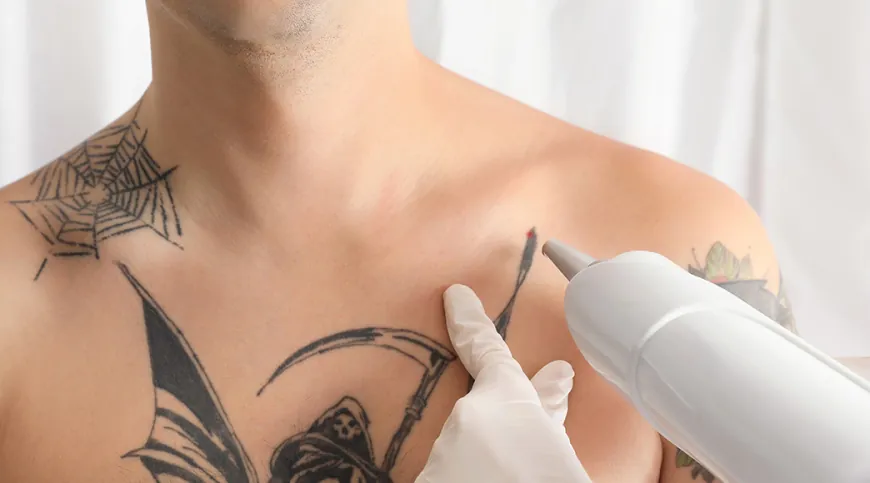How Tattoos Respond to Laser Removal Over Time: Dubai Case Studies
The Enfield Royal Clinic is providing Best Laser Tattoo Removal in Dubai . It is safe, FDA-approved procedure, requires only 4-5 sessions to give a clear skin.

Tattoos are a popular form of self-expression, but over time, people may decide to remove them for various reasons. Laser tattoo removal is one of the most effective and widely used methods for erasing tattoos, and it has become a common procedure in Dubai. Understanding how tattoos respond to laser removal over time is crucial to set realistic expectations and ensure the process is as smooth as possible. In this article, we explore how tattoos respond to laser Tattoo Removal Dubai.
The Science Behind Laser Tattoo Removal
Laser tattoo removal works by using highly concentrated light beams to break down the ink particles in the skin. The laser targets the pigment in the tattoo, causing it to fragment into smaller particles, which are then gradually absorbed by the body’s immune system. Different colors of ink respond to various wavelengths of light, meaning that some pigments may require more treatment sessions than others. This process is non-invasive and relatively quick, though it requires several sessions for complete removal.
Initial Reactions
During the first few days after the treatment, the tattooed area will often show signs of reaction, such as redness, swelling, or minor discomfort. These early signs are typical as the body begins to process the ink particles that the laser has broken down. In Dubai, many patients notice that the tattoo may appear to fade slightly after the first session, but it can take multiple sessions before significant fading becomes visible. The skin around the tattoo may also feel slightly tender, which usually subsides after a few days.
Fading Process
Over time, as additional laser sessions are performed, the tattoo starts to fade more noticeably. The response varies depending on factors like the color, depth, and type of ink used in the tattoo. Case studies in Dubai have shown that darker inks, such as black and blue, tend to fade quicker than lighter colors. This is due to the laser’s ability to target darker pigments more effectively. In some cases, tattoos may show significant fading after just a few treatments, while others may require more time.

Immune System Response
The body's immune system plays a key role in the tattoo removal process. After the laser shatters the tattoo ink, the body’s white blood cells begin to clear away the broken-down pigment. Over time, the tattoo fades as the immune system works to process the ink. This process can take several months, and the results become more noticeable as the body continues to remove the ink from the skin.
Session Frequency
Laser tattoo removal requires multiple sessions spaced a few weeks apart to allow the skin to heal and the immune system to process the ink. Over time, the number of sessions needed to fully remove the tattoo may decrease. For example, after several sessions, the tattoo might fade significantly to the point where fewer treatments are required to finish the process. In case studies observed in Dubai, patients report that the number of sessions can range from a few to over a dozen, depending on various factors, including the size and complexity of the tattoo.
Long-Term Results
After a series of laser sessions, most tattoos will fade to the point where they are no longer visible. In some cases, however, traces of the tattoo may remain, especially for individuals with stubborn pigments or tattoos that were professionally applied using deep ink. While most tattoos are completely removed after a full treatment course, there may be subtle remnants left behind, such as lighter patches or slight discoloration in the skin.
Psychological Impact and Patient Experience
The process of tattoo removal can also have a psychological impact on patients. Many individuals who choose to undergo tattoo removal in Dubai may have personal or professional reasons for doing so. Over time, the fading and eventual disappearance of the tattoo can lead to an improvement in the individual’s confidence and sense of self. On the other hand, the process of waiting for the tattoo to completely fade can be emotionally challenging, particularly for those who have more extensive tattoos or tattoos in hard-to-remove areas.
Conclusion
Laser tattoo removal in Dubai provides a safe and effective method for removing unwanted tattoos. Over time, the tattoo fades as the body’s immune system processes the fragmented ink particles. Although results vary based on various factors, such as the tattoo’s ink color and placement, most tattoos gradually disappear with multiple treatment sessions. Patience is crucial in this process, as the body works steadily to clear the ink. With proper aftercare and expert guidance, the tattoo removal process can be a smooth and successful experience, leaving patients with clearer skin and improved self-esteem.












